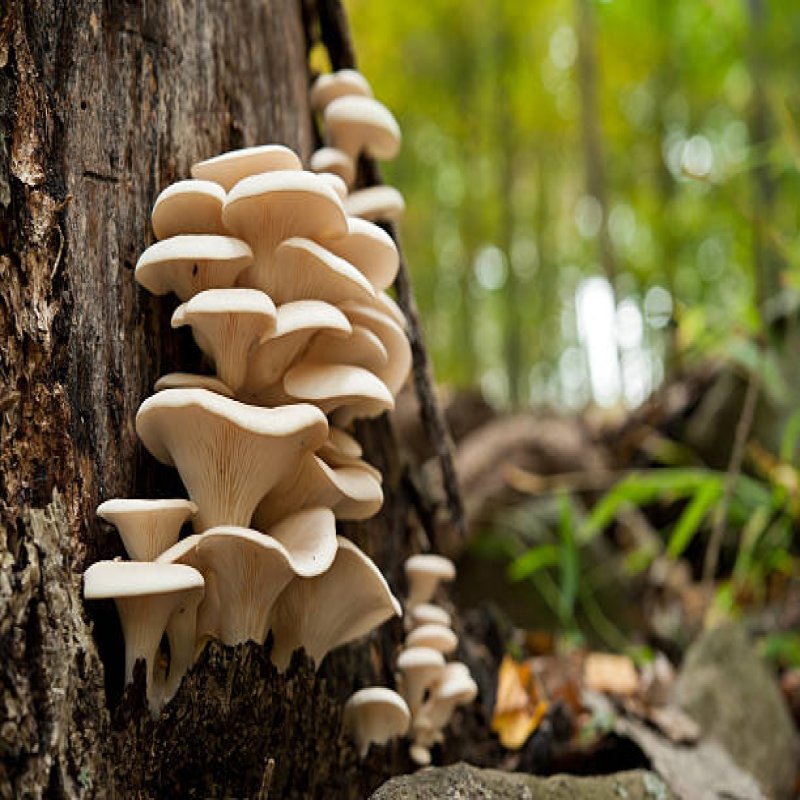
Mushrooms are now widely used in many Indian dishes, as they are a good vegetarian option. Oyster mushrooms are often disregarded by people due to their weird appearance. Although oyster mushrooms are technically a species of fungus, they are tasty to eat, easy to cook, and have a number of health benefits.
Read on to know more about the health benefits of oyster mushrooms!
Oyster mushroom is commonly known by many names in India, such as “dhingri” in Hindi or “sippi kalan” in Tamil. It is an edible mushroom that was first cultivated in Germany for sustenance during World War I. Nowadays, it is grown commercially throughout Europe, Asia, and North America.
Oyster mushrooms are scientifically known as Pleurotus ostreatus. They are abundantly present in temperate and sub-tropical forests throughout the world. They usually grow on dying hardwood trees. Oyster mushrooms are popular in South Asian, Japanese, and Central European cuisines.
- The Latin name Pleurotus ostreatus means “sideways oyster”, which refers to the oyster-like shape of the mushroom.
- Oyster mushrooms have a unique scent that is often described as sweet, like anise or liquorice.
- The mycelia (the threadlike structure in a fungus) kills and eats small roundworms and bacteria, which makes them one of the few carnivorous mushrooms.
Around 3,000 years ago, oyster mushrooms had significant uses in ancient Chinese medicine, particularly as a tonic for the immune system, according to acupuncturist Christopher Hobbs, author of “Medicinal Mushrooms.” Oyster mushrooms are popularly grown in the state of Kerala, India.
Health Benefits of Oyster Mushroom
Oyster mushrooms are rich in protein, which is extremely beneficial for people who follow a vegetarian diet. It is also a good source of niacin (vitamin B3), which has many important roles in our body. Other than these, oyster mushrooms contain a good amount of carbohydrates, sodium, and potassium. They also contain iron, magnesium, vitamin D, and vitamin B6.
Some of the health benefits of oyster mushrooms are as follows:
Prevents Cancer
Oyster mushrooms contain antioxidants that help prevent the growth of cancerous cells. A study carried out by the Methodist Research Institute’s Cancer Research Laboratory found that oyster mushrooms are capable of inhibiting the growth and dissemination of breast and colon cancer cells. Another study conducted in 2011 showed that oyster mushroom extract had therapeutic effects against colorectal tumors and leukemia.
Boosts Brain Function
Oyster mushroom contains niacin, which aids in proper functioning of the brain. Clinical research has shown that niacin protects against Alzheimer’s disease and cognitive decline in older adults.

Maintains Blood Pressure
Oyster mushrooms contain potassium, which aids in keeping blood pressure at a normal level. Table salt contains sodium, which can lead to high blood pressure if you consume it in excess. However, potassium helps to lower blood pressure by balancing out the negative effects of excess sodium consumption.

Relieves Constipation
Dietary fibers are crucial for maintaining good digestive health. Oyster mushrooms contain dietary fibers, which help absorb water in the intestine. This helps in the smooth movement of fecal matter and thus relieves constipation.

Prevents Anemia
Oyster mushrooms contain iron, which helps in preventing anemia. Anemia causes the occurrence of fewer red blood cells than normal. This leads to low production of hemoglobin, which in turn reduces the amount of oxygen in the body. All this happens mainly due to iron deficiency, as iron helps in the growth of red blood cells in the body.

How can you Include Oyster Mushrooms in your Diet?
Mushrooms are a favorite among many, thanks to their earthy flavor and ease of cooking. You can eat it in a variety of ways. Mushroom soup with tomatoes and basil is excellent for driving away coughs and colds. Did you know that oyster mushroom is one of the main dishes on a traditional English breakfast menu?
Nowadays, popular restaurants have also come up with dishes such as "mushroom "kebabs"—sounds interesting, right? “Kalan milagu varuval” is a popular South Indian dish that is simple to cook and provides a delicious meaty flavor. “Kombhu barthad,” or mushroom chili fry, is a famous dish in Coorg, Karnataka.
Now that we know about the various health benefits of eating oyster mushrooms, let us now see how we can incorporate them into our daily lifestyle.
- If you want to follow a vegan diet, but don’t want to lose out on your daily intake of proteins, shallow fry oyster mushrooms with salt and pepper and eat them during breakfast.
- Oyster mushroom stir-fry is a common Chinese dish, which you can cook quite easily.
- Korean mushroom soup is a nutritious soup which is made with oyster mushrooms. This is extremely beneficial for people following a gluten-free diet.
- Mushroom and peas curry is a lip-smacking Indian dish that you can eat with chapattis.
- You can also use Oyster mushrooms to make healthy dips and sandwich spreads.
Although oyster mushrooms are expensive, it’s one of the best vegetarian sources of protein. This makes it extremely beneficial for us since a large population of Indians are vegetarians.
Disclaimer: Do not eat raw mushrooms, as you may intake spores, which might cause allergic reactions. Oyster mushrooms contain arabitol (a kind of sugar alcohol) that might cause gastrointestinal problems in some people.
Nutritional Information
100g of oyster mushroom provides 33 calories.
Carbohydrates – 6g (Dietary Fiber – 2.3g, Sugar – 1.1g), Protein – 3.3g, Fat – 0.4g (Saturated fat-0.1g PUFA – 0.1g), Sodium – 18mg, Potassium – 420mg
And percentage daily value of Iron – 7%, Magnesium – 4%, Vitamin D- 7%, Vitamin B6 – 5% (based on a 2,000-calorie diet)


.png)


